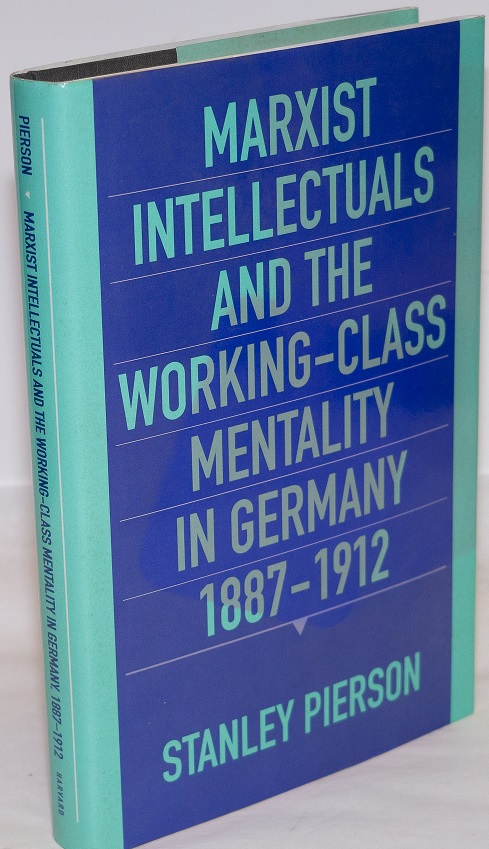Stanley Pierson. Marxist Intellectuals and the Working-Class Mentality in Germany, 1887-1912.
Cambridge, Massachusetts: Harvard University Press, 1993.
330 páginas.
¿Cómo se explica la presencia de reclutas instruidos en movimientos de composición abrumadoramente obrera? ¿Cómo funcionaban los intelectuales dentro de estos movimientos? En la primera exploración en profundidad de esta cuestión, Stanley Pierson examina el ascenso, desarrollo y fracaso final de los socialdemócratas alemanes, el mayor de los partidos socialistas europeos, entre 1887 y 1912. Se habla de figuras prominentes como Karl Kautsky, August Bebel, Rosa Luxemburg y Eduard Bernstein, pero el libro se centra sobre todo en la generación más joven. Estos intelectuales olvidados -Max Schippel, Paul Kampffmeyer, Conrad Schmidt, Paul Ernst y otros- lucharon más directamente con los dilemas derivados del intento de traducir las doctrinas marxistas a términos prácticos y personales.
Estos jóvenes escritores, oradores y políticos se propusieron sustituir las viejas formas de pensar por una comprensión marxista de la historia y la sociedad. Pierson entrelaza más de treinta biografías intelectuales para explorar la relación entre ideología y política en Alemania. Examina el conflicto dentro de la socialdemocracia entre los intelectuales «revisionistas», que trataron de adaptar la teoría marxista a las cambiantes realidades económicas y sociales, y los intelectuales «ortodoxos» y «radicales» que intentaron mantenerse fieles a la visión marxista. Al examinar las luchas de los intelectuales socialistas en Alemania, Pierson pone de manifiesto las características especiales de la vida cultural, social y política alemana antes de la Primera Guerra Mundial. Su estudio de esta época crítica en el desarrollo del partido socialdemócrata alemán también ilumina el desarrollo más amplio del marxismo en Europa durante el siglo XX.
Contents
Preface
Introduction
1 – The Protest of the Young Intellectuals
The Berliner Volks-Tribüne, the Übergangsmensch, and the Inner Movement
The Jungen Rebellion
The Jungen Appeal to Engels
2 – The Academics as Critics
Max Schippel: The Marxist Intellectual as Politician
Paul Kampffmeyer: A Marxist Alternative to Politics
Conrad Schmidt: Questions of Economic Theory and Philosophy
Paul Ernst: Questions of Aesthetics and Practice
3 – Two Paths for Marxist Intellectuals
Kautsky’s Clarification and Dissemination of Orthodox Marxism
Heinrich Braun: Marxism as a Guide to Immediate Reforms
4 – Discovering the Akademikerproblem
Richard Calwer: Judging the Party in the Light of the Communist Manifesto
The Frankfurt Conference: The Question of Salaries
Kautsky on the Relationship between the Party and Bourgeois Intellectuals
The Agrarian Question
5 – The Cultural Meaning of Marxism
The Sozialistische Akademiker, 1895-1896
The Question of a Socialist Culture: Franz Mehring, Edgar Steiger, and the Gotha Conference
6 – Revising Marxism
Bernstein’s Challenge and the Response of Kautsky and Bebel
An Alternative Path for Social Democrats: Kampffmeyer and Schmidt
The Intellectual as “Praktiker”: Schippel, Calwer, and Wolfgang Heine
The Neo-Kantian Revisionists
Female Revisionists: Lily Braun and Rosa Luxemburg
7 – The Akademikerproblem, 1901-1903
Kautsky: Defending Orthodoxy
Braun’s Attempt to Mobilize Revisionist Intellectuals
Preparing for a Showdown: Kautsky, Bebel, and Mehring
8 – The Rout of the Revisionist Intellectuals
The Contributor Debate
After Dresden
The Purge of Vorwärts
9 – The Making of a Socialist Mentality
The Problem of “Enthusiasm”: Raphael Friedeberg, Robert Michels, and Luxemburg
Renewal through Education: Otto Rühle and Heinrich Schulz
10 – Revisionists, Nationalism, and Accommodation
The Sozialistische Monatshefte: Reexamining the Party’s History
The Nationalism of the Revisionists
Accommodation by the Social Democratic Politicians
The Hildebrand Affair: The Limits of Revisionism
11 – The Exhaustion of Orthodox Marxism
Kautsky: The Dilemmas of Orthodox Marxism
The Radical Marxists: Renewing the Revolutionary Drive
Orthodox Marxism as an Apologetic
The Radical Marxists: The Myth of the Proletariat
Epilogue
